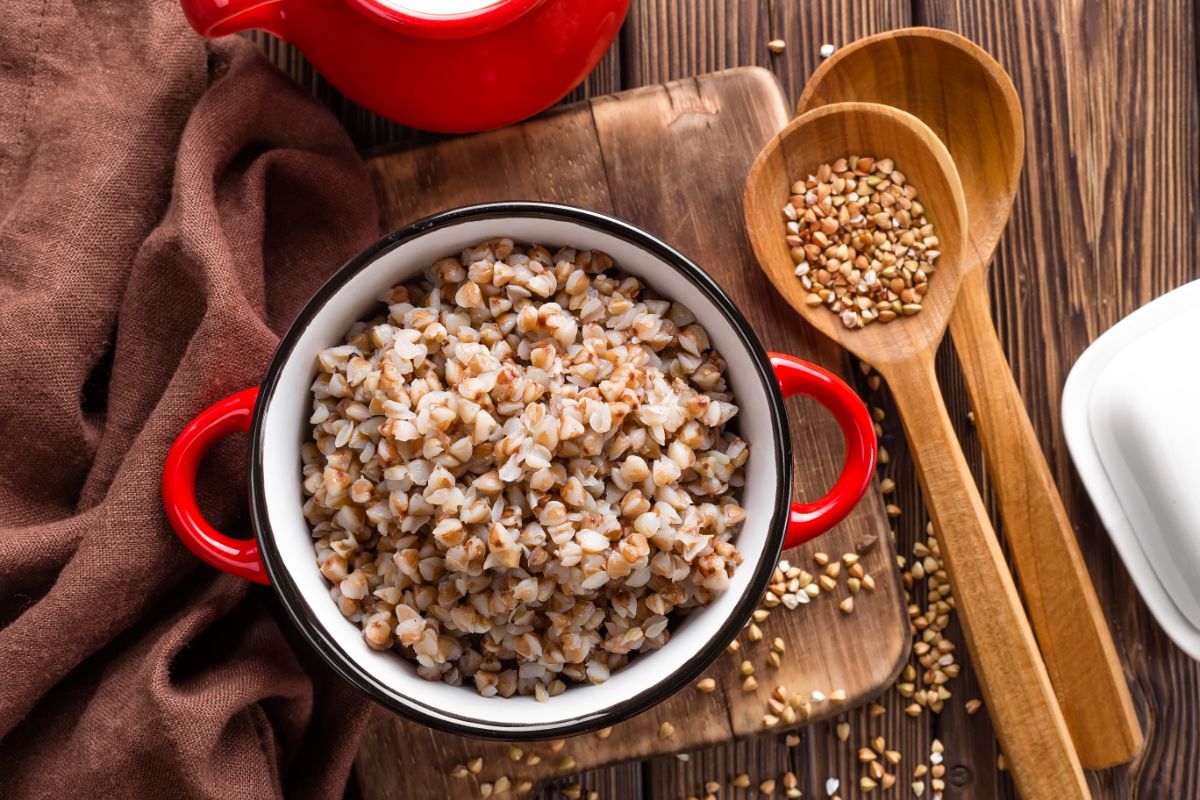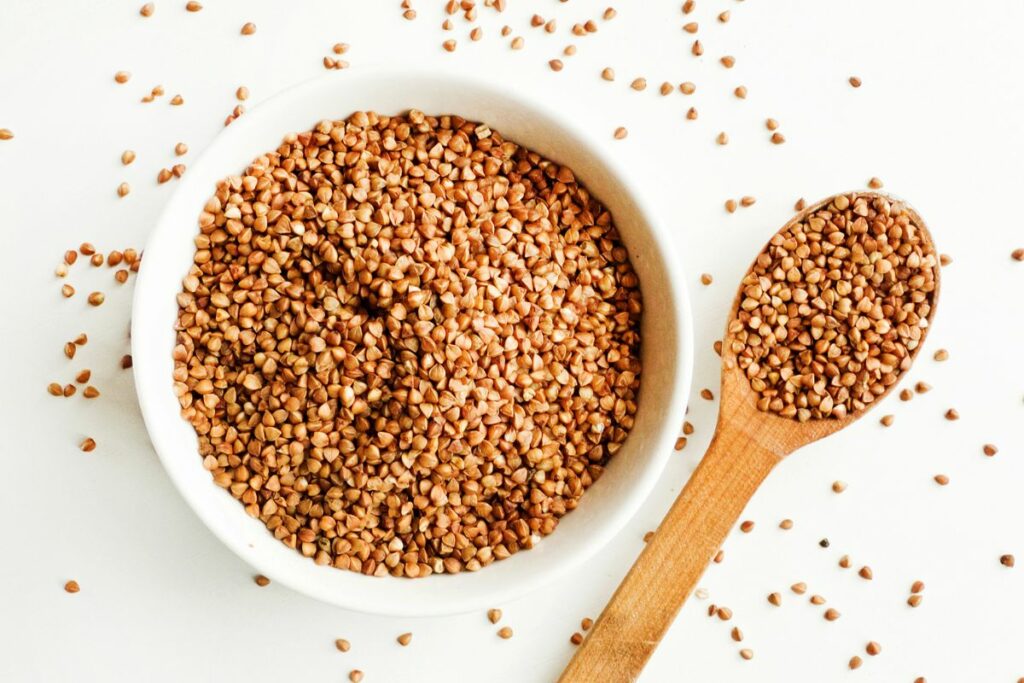Buckwheat is a part of the food group known as pseudocereals – these are seeds that are consumed as cereal grains; although, they don’t grow on grasses.
Other types of pseudocereal include amaranth and quinoa.
In spite of its name, buckwheat isn’t considered the same as wheat – in fact, it is gluten-free. Here, buckwheat can be used in tea or manufactured into flour, noodles, rice, and groats.
Groats, used similarly to rice, is a common ingredient in many traditional Asian and European dishes.
Buckwheat has become incredibly popular in recent years thanks to its high antioxidant and mineral content. Plus, it is also considered to help blood sugar control.
Although, despite what you may think, buckwheat is considered closer to a carb than protein.
Moreover, there are two types of buckwheat: Tartary buckwheat (Fagopyrum tartaricum) and common buckwheat (Fagopyrum esculentum).
With all this in mind, this guide will explore everything you need to know about buckwheat and whether it is considered more of a carb or protein.
Nutritional Value
The main dietary component found in buckwheat is carbs. However, you will also find various antioxidants and minerals present too, including protein.
When compared to other types of grains, buckwheats’ nutritional value is considerably larger. Below, we have outlined the nutrition factors for 3.5 ounces (100 grams) of buckwheat.
- Water – 10%
- Calories – 343
- Carbs – 71.5 grams
- Protein – 13.3 grams
- Fiber – 10 grams
- Fat – 3.4 grams
- Sugar – 0 grams
Fiber
There is a decent amount of fiber found in buckwheat – which cannot be digested by your body – this is ideal for the health of your colon.
In terms of weight, fiber contributes 2.7% when boiled as groats and generally consists of lignin and cellulose.
Here, the fiber is mostly found in the husk – this is the part coating the groat. For some dark buckwheat flours, the husk remains – providing a distinct flavor.
Likewise, you’ll also find resistant starch in the husk which is also resistant to digestion, too. As a result, it is considered fibrous.
In your colon, gut bacteria ferment resistant starch. These healthy bacteria generate short-chain fatty acids (SCFAs), including butyrate.
In fact, these short-fatty acids provide nutrition to the cells inside the colon – not only does this improve your overall gut health but reduces the chances of developing colon cancer.
Protein
There are small amounts of protein found in buckwheat. In terms of weight, boiled buckwheat groats only consist of 3.4% protein.
Although, since buckwheat contains a well-balanced amino acid profile, it makes the protein found here very high quality – particularly rich in amino acids arginine and lysine.
However, that being said, the digestibility of these proteins is moderately lower due to the antinutrient content which includes tannins and protease inhibitors.
When looking at animals, the protein found in buckwheat can be effective in lowering blood cholesterol levels – reducing the chances of colon cancer, and suppressing gallstone formation.
Carbs
As previously mentioned, buckwheat is primarily made up of carbs – this contributes around 20% of the overall weight of boiled groats.
Here, carbs are found in the form of starch – which is the plant’s main form of storage.
On the glycemic index, buckwheat scores low to medium – this measures how fast the buckwheat raises blood sugar after eating. As a result, buckwheat is not likely to cause unhealthy spikes.
In fact, there are soluble carbs found in buckwheat, including D-chiro-inositol and fagopyritol, that are known to help moderate blood sugar levels.
Vitamins and Minerals
When compared with other cereals – including corn, rice, and wheat – buckwheat is richer in minerals.
That being said, buckwheat doesn’t contain high levels of vitamins. When comparing the two variants, Tartary buckwheat is considered to contain more nutrients as opposed to common buckwheat.
Below, we have outlined the amplest minerals found in common buckwheat.

- Copper – This is often a mineral lacking in the common Western diet. However, copper, a trace element, can be an essential component in the health of your heart when consumed in small quantities.
- Manganese – This is essential for healthy growth, metabolism, and development, as well as aiding in your body’s antioxidant defenses. The best part? In whole grains, this can be found in large amounts.
- Phosphorus – This mineral is important in the maintenance and growth of your body’s tissue.
- Iron – This is also an essential mineral. A deficiency in iron can lead to anemia – a condition whereby the supply of oxygen in your blood is reduced.
- Magnesium – When present in your diet in large amounts, this mineral has the ability to potentially lower the chances of many chronic conditions, including heart disease and type 2 diabetes.
When compared to different types of grain that can lose their minerals when cooked, buckwheat maintains its absorbed contents particularly well.
This is primarily due to the fact that buckwheat contains low levels of phytic acid – this is a common inhibitor preventing the absorption of minerals, and is found in seeds and grains.
Health Benefits of Buckwheat
There are many health benefits to incorporating buckwheat into your diet, this is especially true for the digestive system.
For instance, if you have digestive problems or food restrictions, then adding buckwheat to the menu can be beneficial.
Controls Blood Sugar Levels
A study that compared the eating habits of buckwheat found that those regions that eat more buckwheat had almost 17% lower blood sugar levels.
Since buckwheat contains a low rating of glycemic, as well as beneficial polyphenols, content, it makes it beneficial to those suffering from diabetes.
Ideal For Those With Celiac Disease
Despite its name, buckwheat doesn’t contain any wheat; thus, making it entirely gluten-free. As a result, you will typically find this as the main ingredient in many gluten-free kinds of cereal.
However, that being said, do not automatically assume a product is gluten-free just because it contains buckwheat.
Make sure to always read the gluten-free certification label before consuming a product you’re unfamiliar with.
Assist Irritable Bowel Syndrome (IBS)
Since buckwheat is nutrient-rich, it is ideal for anything following a restrictive diet.
Likewise, it also contains low levels of FODMAPs – this is a type of carb that is known to exacerbate digestive problems in some people.
Hence, those suffering from irritable bowel syndrome are recommended to follow a long FODMAP diet. Plus, temporarily eliminating FODMAP foods can also help to determine trigger foods.
Final Thoughts
The phrase ‘small but mighty’ certainly applies to buckwheat – it is no surprise that it has become a popular ingredient among health enthusiasts over the years!
In addition to its versatility, buckwheat is packed with beneficial nutrients and minerals. This includes high levels of carbs and fiber.
Moreover, if you are suffering from diabetes or looking to maintain a healthy digestive system, then you may want to consider adding this super-food into your diet more regularly.
Hopefully, this guide has informed you on whether or not buckwheat is a protein or carb, as well as all the health benefits alongside it.








